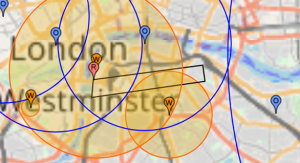Urgent blood samples are now being transported in London between National Health Service (NHS) hospitals by autonomous drones, in an on-demand medical delivery service which aims to improve patient care by speeding up testing turnaround times and pave the way for autonomous drone delivery services at scale in the UK.
The six-month operation is regulated by the Civil Aviation Authority (CAA), which has granted the airspace approval, and is one of several CAA sponsored “TRA sandbox trials” underway in the UK, which it hopes will lead to scalable beyond visual line of sight (BVLOS) operations throughout the UK by 2027.
This latest trial has been organised as a partnership between Guy’s and St Thomas’ NHS Foundation Trust, Apian – a healthcare logistics company founded by NHS doctors – and Wing, the global drone delivery company part of Google’s parent company, Alphabet. The initial trial is for six months but according to Louisa Smith, Chief Aviation Officer at Apian, the ambition is to move to more longer-term operations and increase the scale of deliveries.
For the current six-month trial the CAA has granted approval for a Temporary Reserved Area (TRA), a few miles long and several hundred yards wide above a very busy urban area, for the drones to make up to 10 deliveries a day. The autonomous drone chooses its own route within this area, based on weather and other factors. The drone operators have worked with air navigation service provider NATS to ensure operations can take place without interfering with other low level air traffic in the area, such as emergency helicopter operations.

“The trial, in agreement with the CAA, is to collect data to show that we can safely operate without the need for a TRA,” said Louisa Smith. “Part of our sandbox application is to prove we do not need to segregate but can safely integrate and what the next steps should be to move forward. It’s a significant step compared to previous trials.”
It has taken Apian around two years of working with the CAA to meet the regulations – and one year between the initial operational request and approval – to ensure air and ground risk safety challenges are met. Wing has provided extensive evidence of its air and ground systems to support the safety case for flying in south London.
Apian and Wing also undertook a comprehensive outreach programme to nearby communities – leafletting over 10,000 inhabitants and organising numerous events with residents’ associations, giving people the opportunity to look at the drone and understand the operation in detail.
According to the CAA, this is a landmark first for the NHS in London. Apian and Wing have previously partnered on medical drone delivery in Dublin, Ireland, and Apian has trialled medical drone deliveries in rural areas of the UK. “Blood samples are currently delivered by van and motorbike couriers,” says the CAA in a website post. “Switching to drone deliveries will have significant environmental benefits by removing carbon emissions and reducing traffic congestion. Lightweight commercial drones can reduce CO2e emissions by up to 99% compared to non-electric cars and reduce transportation electricity needed compared to electric delivery vans.”
Lawrence Tallon, Deputy Chief Executive of Guy’s and St Thomas’, said: “This drone trial to deliver blood samples should speed up test results for some of our most vulnerable patients, ensuring they have the very best care. It combines innovations in healthcare with sustainability to give us an NHS fit for the future.”
Apian’s ambition is to create an autonomous delivery network operating at NHS scale, moving physical items as productively as the internet moves information. The ambition is to move towards scaling up beyond one-drone-to-one pilot (1:1). “We absolutely want expansion beyond one drone per pilot,” said Louisa Smith. “Operating at scale is where drones can bring real benefits and we want to see drones working at critical times for the NHS, where there is a reduction in staff overnight and weekends, for example.”
While the London operation is built to serve on-demand sample delivery with up to ten flights per weekday, Wing is able to oversee drones 1:16 in the USA and 1:50 in Australia, according to the company.
Martin Rolfe, NATS CEO, said: “Enabling drones to safely fly in central London, within some of the world’s busiest and most complex airspace, is a major milestone and we are delighted to be supporting Apian and the project team in making it a reality. Working towards greater integration of drones into UK airspace will mean hugely beneficial services like this can become routine rather than the exception.”




